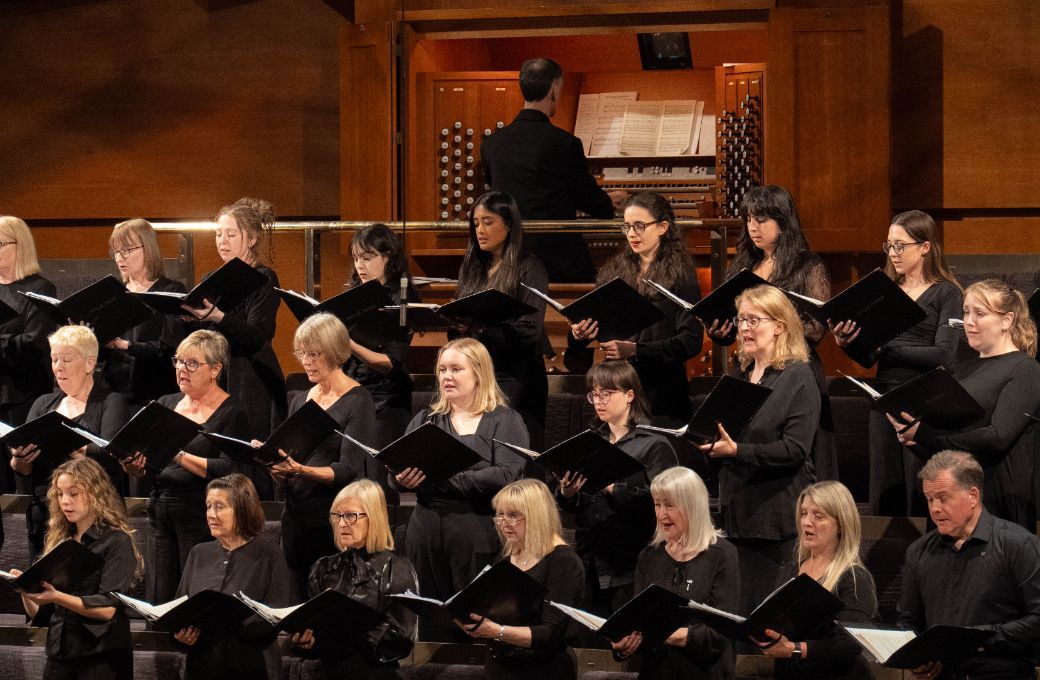The Hallé Orchestra and the Hallé Choir ended their season at the Bridgewater Hall with a spectacular concert of short pieces. Most of the works would count as “popular classics” but this programme had been expertly curated by Matthew Hamilton, the Hallé’s choral director, to create a very pleasing concert. The juxtaposition of pieces highlighted a great variety of styles, demonstrating the many strengths of both orchestra and choir. Unfortunately, Hamilton had had to withdraw at the eleventh hour, his role taken at short notice by Stephen Bell, well known to Manchester audiences as conductor of the Hallé Pops. Bell’s introductions to the programme were engaging and enhanced the whole experience.
The concert began with Handel’s Zadok the Priest, indelibly associated with coronations ever since George II’s in 1727. Organist Darius Battiwalla made a sterling contribution, and it was good to hear a modern orchestra playing Handel, and the Hallé Choir gave a thrilling performance. Bach’s Jesu, Joy of Man’s Desiring proved a gentle Baroque contrast. The focus moved from church to theatre and from choir to orchestra with a spirited account of the overture to Mozart’s The Magic Flute. Clearly the Hallé was not going to be overshadowed by its choir.
These three well-loved pieces were followed by something much less familiar. The choir, accompanied by organ alone, sang Samuel Sebastian Wesley’s anthem Thou wilt keep him in perfect peace, conveying the peaceful calm of this beautiful anthem perfectly. This mood continued in the next purely orchestral piece, Morning from Grieg’s incidental music to Peer Gynt with some exquisite woodwind solos. The Hall of the Mountain King followed with a rare chance to hear choral outbursts from the trolls. Bell kept the accelerando under careful control, making the final moments particularly exciting. The first half of the concert concluded with the evening’s first piece of Italian opera. Darius Battiwalla led us into the Easter Hymn from Cavalleria rusticana, soon to be joined by the choir and orchestra. Few opera companies can have choruses the size as the Hallé Choir (150 names were listed in the programme) and the effect was exhilarating.

In Verdi’s overture to The Force of Destiny, Bell elicited fine woodwind solos and built up tension and a sense of foreboding but rather than the drama of the opera this was followed by the Hallé Choir singing a cappella Barber’s Agnus Dei, the choral version of his Adagio. This proved to be every bit as affecting as the more familiar version for strings. Fauré’s Pavane, too, is better known in its non-choral guise. Here, with orchestra and choir, it was radiantly beautiful, although the words, displayed on a screen above the stage, made little sense out of context.
Another rarity followed: Karl Jenkins’ Palladio for strings captivated with its intense rhythms. The spotlight shifted from strings to brass for the Triumphal March from Verdi’s Aida, bringing to mind the grandest of arena productions. The Hallé Choir had one final opportunity to show off their skill unaccompanied and dazzled with verbal dexterity as well as their singing in Raymond Wise’s I’ll Stand. I hope it was as much fun to perform as it was to listen to. Finally we returned to the world of royal events where the evening had begun, everyone raising the roof with Parry’s I was Glad. An inspiring way to finish a season!


